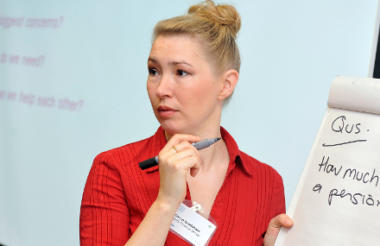Charities face a challenging fundraising landscape in the lead up to Christmas, with nearly half predicting fewer donations than normal, a survey has warned.
One-fifth of charities also do not think they can provide an adequate service over the festive period, according to the latest findings from a tracker survey conducted by Pro Bono Economics in partnership with the Charity Finance Group and the Chartered Institute of Fundraising.
Nearly 300 charities responded to the survey, which took place earlier this month.
Charity leaders have now said the government must step in with extra support for the sector before it is too late, with Caron Bradshaw, chief executive of the Charity Finance Group, warning of a “yawning, multi-billion-pound hole in charities’ finances”.
Crucial Christmas fundraising period
The run-up to Christmas is one of the most important fundraising periods for the sector, with CAF’s UK Giving report finding that more people give in November and December than at any other time of year.
However, just 3% of respondents to the Pro Bono Economics survey expect to raise more from this year’s Christmas campaign than last year's.
A quarter said that they expect to raise more than 25% less and just over one-fifth said they expect to raise up to 25% less. Some 40% said they expect no change, and 10% said they were unsure about what would happen.
Daniel Fluskey, head of policy and external affairs at the Chartered Institute of Fundraising, said: “Many charities rely on their fundraising activity around Christmas to provide the funds needed to fund services for the year ahead.
“We believe that people will still want to give what they can, but the cancellation of community events, such as winter fairs, carol concerts, quiz nights, or working with local schools, scout groups, and businesses, will cause severe disruption, leaving a big hole in the income that charities need."
Services under pressure
While over half the respondents are confident that they will be able to deliver an adequate service during December, a significant minority say they will not be able to.
Eleven per cent said it is quite unlikely that they will deliver an adequate service, while 18% said it is very unlikely. 19% said neither unlikely nor likely.
The survey was carried out prior to yesterday’s announcement about changes to government support for businesses and charities, however just 10% of respondents said that they planned to use the Job Support Scheme – the successor to the Job Retention Scheme.
Meanwhile, 23% of charities said that they expect to make staff redundant once the Coronavirus Job Retention Scheme ends later this month. Of these, most (15%) said they expect to make up to 10% of their staff redundant.
The survey was conducted prior to the chancellor's announcement of changes to the scheme's successor, the Job Support Scheme, which will now offer greater assistance to employers.
What would help?
The most popular answer to the question about what additional support is needed was “additional financial resources” (68%).
Some 41% said that certainty about social distancing requirements in the future would help, and 26% cited more opportunities to collaborate.
Just 7% said they needed no extra help, while 17% said more volunteers could improve their outlook.
Caron Bradshaw, chief executive of Charity Finance Group, said: “There is now a mountain of evidence that charities need further financial support before it is too late. We are running out of road and the government can’t bury its head in the sand on this issue anymore.
“Tens of thousands of jobs are being lost from the sector. There is a yawning, multi-billion-pound hole in charities’ finances which is threatening to fatally undermine the work they do across our nation and in the heart of our communities.
“Government urgently has to determine what kind of society it wants. We cannot be expected to be first in line to provide support but last in line to receive it. A fraction of the fiscal support that has been provided to support business has been extended to charity, once again failing to recognise the critical financial and non-financial impact social change organisations have on society and the economy.
“If the government turns its back on the sector now, it is hard to see how the levelling up agenda or aspirations to ‘build back better’ can be achieved.”
Matt Whittaker, CEO of Pro Bono Economics, added: “Our data consistently shows a charity sector desperately trying to balance rising demand and diminished resources. Organisations have shown remarkable resolve, continuing to support millions of people up and down the country with a whole range of challenges – from physical and mental health to domestic violence, and from issues around education and employment to financial hardship.
“But the equation simply doesn’t add up. Without government intervention, it’s impossible to avoid the conclusion that many more people will be left without the help that they need.”
Related articles












